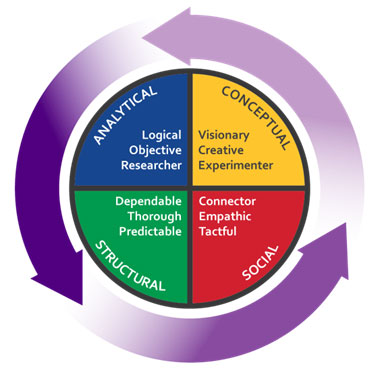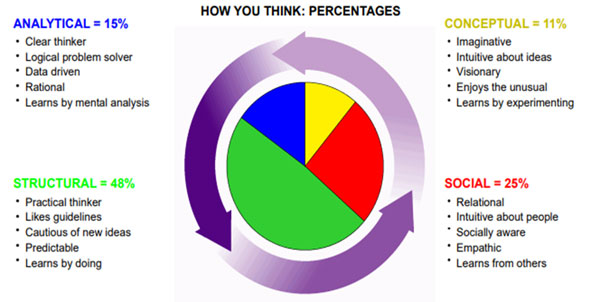Aurora Petrova, National Graduate Development Programme (NGDP) trainee, reflects on her experience of using our Emergenetics® profiling tool and how it helped to develop self-awareness and increase her confidence in her first placement in the Workforce Team at the LGA.
From the ‘great resignation’ to the ‘great reshuffle’ and the ‘great re-think’, it is no surprise that more than 65 per cent of workers are considering a career change. Delving deeper, one in five workers (20 per cent) say it’s likely they will quit their current role in the next 12 months - suggesting disengagement and dissatisfaction is high.
In the words of Socrates, “knowing thyself is the beginning of all wisdom” and this wisdom extends to our professional, as well as personal life; yet only 10-15 per cent of workers are truly ‘self-aware’. According to Forbes, 90 per cent of top performers are highly emotionally intelligent, so it’s clear there is a strong relationship between self-awareness, engagement and performance.
90 per cent of top performers are highly emotionally intelligent
Like many other graduates who were entering the workforce for the first time, I was met with uncertainty about what I wanted to do, and about who I was, and when I am unsure of who I am and what I want, I can become disengaged and begin to forget what I am capable of.
I know a few things about myself; a bit reserved, but a lot more open with my closest friends – would that make me an ‘introvert’, or an ‘extrovert’? Apparently, that makes someone more of an ‘ambivert’ - I’m already struggling with these labels, so in true ‘gen Z’ style, I refuse to put myself in a box!
So how could psychometric profiling help here?
Emergenetics in action: Warwickshire County Council ‘away day’
In my first week of the National Graduate Development Programme (NGDP), I joined the Workforce Team and learned about our brand new Emergenetics personality profiling offer, that helps councils build high-performing and collaborative teams.
I had the opportunity to visit Warwickshire County Council and take part in their Emergenetics feedback session, as part of their corporate policy team’s away day. I was also able to meet their graduates on the NGDP and find out more about their placements.
The high-energy and interactive session explored the policy team’s group profile, which included their ‘behavioural attributes’ and ‘thinking preferences’. Our thinking and behavioural attributes are all made up of things that ‘emerge’ from our life experiences and our ‘genetics’ (DNA), which makes this psychometric testing tool scientifically valid and analytically robust since it’s developed from psychology, social analytics, and brain science. Although I had joined the LGA less than 72 hours ago, I had already begun to think about what my profile spread would look like.
The practical workshop entailed a few exercises that asked us to think of how we would behave in a certain scenario to examine our expressiveness, assertiveness, and flexibility. These are the ‘behavioural attributes’ that Emergenetics tests for. We then turned to explore the spread of the teams’ ‘thinking preferences’ in comparison to the rest of the population (there have already been over 1 million Emergenetics made!).
Whilst the group were comparing their profiles, I had a short, separate informal session with the Warwickshire graduates where we spoke about what our ‘colours’ would be. We had all joined the NGDP very recently, so were brand new to our teams. I instantly knew I’d be ‘green’, as I enjoy structure and guidelines, so I was excited when I was told I could have a profile made, as this meant I could find out more about my preferences and behaviours. The Warwickshire graduates were also keen for a profile to be made for them, as they missed out when they first joined.
My Emergenetics profile
My pie chart showed my most preferred preference (48%) was ‘Structural’, which confirmed what I thought about myself. But there were some surprises too; whilst I would traditionally describe myself as an ‘introvert’ at work, my second preferred preference is ‘Social’, so I look to others for opinions and try to be relational. This surprised me as the profile doesn’t quite fit with traditional labels of introversion and extroversion, which I greatly appreciated as those labels can be too stereotypical (and as previously mentioned, don’t really work for me). The pie chart was an incredibly useful, visual tool to help me conceptualise my strengths.
It’s important to note that in Emergenetics there are no ‘best’ or ‘worst’ profiles, and they are not indicative of ability. A profile focuses on our strengths only, which I feel is important to know since it’s all about understanding who we are, in order to help us work better and be more engaged.
I was also able to join the Emergenetics+ app, where there are lots more resources to help me understand my profile. For example, there are resources on how to communicate with colleagues within each attribute. There was also a tips sheet to help me grow or reduce a certain type of attribute, which will certainly prove useful across my graduate programme.
Final thoughts
Having participated in the pilot session with Warwickshire, it was clear that this style of personality profiling had been a success in engaging teammates and making them more aware of their individual strengths. The Corporate Policy Unit has been using their newly gained self-understanding to facilitate team and personal development, and 1:1 discussions.
Sophie Kitching (Graduate Trainee from Warwickshire) also commented on her experience, “what I found most useful was how it enabled a space for reflection, both personally and as a team. It's quite rare that we get a moment to stop and actually reflect on how we think and mesh together as a team, and it was helpful to take this time and learn more about our own and others' strengths.”
I feel that this type of profiling session can work well if you have a new starter, graduate or apprentice. It could be easily used as an away day item, as part of your team and personal development, or even as part of the induction process.
From a personal perspective, I feel more confident in knowing where my strengths lie by having this simple framework. The key ‘driver’ behind my two-year programme is ‘development’, so having my profile to refer to will prove incredibly useful. Seems like it’s worked the trick!
If you would like to hear more about personality profiling using Emergenetics and how it can help your team, please email [email protected] and I’d be delighted to let you know more about it.
Make sure to have a look at our web page and read about our Emergenetics pilot sessions for creating effective teams



